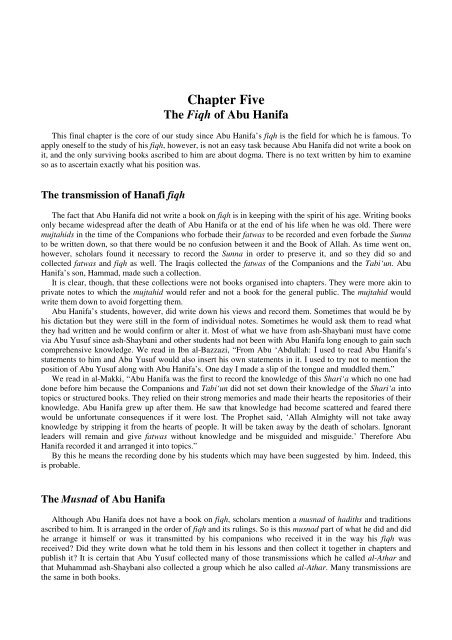Create successful ePaper yourself
Turn your PDF publications into a flip-book with our unique Google optimized e-Paper software.
Chapter Five<br />
The <strong>Fiqh</strong> of <strong>Abu</strong> <strong>Hanifa</strong><br />
This final chapter is the core of our study since <strong>Abu</strong> <strong>Hanifa</strong>’s fiqh is the field for which he is famous. To<br />
apply oneself to the study of his fiqh, however, is not an easy task because <strong>Abu</strong> <strong>Hanifa</strong> did not write a book on<br />
it, <strong>and</strong> the only surviving books ascribed to him are about dogma. There is no text written by him to examine<br />
so as to ascertain exactly what his position was.<br />
The transmission of Hanafi fiqh<br />
The fact that <strong>Abu</strong> <strong>Hanifa</strong> did not write a book on fiqh is in keeping with the spirit of his age. Writing books<br />
only became widespread after the death of <strong>Abu</strong> <strong>Hanifa</strong> or at the end of his life when he was old. There were<br />
mujtahids in the time of the Companions who forbade their fatwas to be recorded <strong>and</strong> even forbade the Sunna<br />
to be written down, so that there would be no confusion between it <strong>and</strong> the Book of Allah. As time went on,<br />
however, scholars found it necessary to record the Sunna in order to preserve it, <strong>and</strong> so they did so <strong>and</strong><br />
collected fatwas <strong>and</strong> fiqh as well. The Iraqis collected the fatwas of the Companions <strong>and</strong> the Tabi‘un. <strong>Abu</strong><br />
<strong>Hanifa</strong>’s son, Hammad, made such a collection.<br />
It is clear, though, that these collections were not books organised into chapters. They were more akin to<br />
private notes to which the mujtahid would refer <strong>and</strong> not a book for the general public. The mujtahid would<br />
write them down to avoid forgetting them.<br />
<strong>Abu</strong> <strong>Hanifa</strong>’s students, however, did write down his views <strong>and</strong> record them. Sometimes that would be by<br />
his dictation but they were still in the form of individual notes. Sometimes he would ask them to read what<br />
they had written <strong>and</strong> he would confirm or alter it. Most of what we have from ash-Shaybani must have come<br />
via <strong>Abu</strong> Yusuf since ash-Shaybani <strong>and</strong> other students had not been with <strong>Abu</strong> <strong>Hanifa</strong> long enough to gain such<br />
comprehensive knowledge. We read in Ibn al-Bazzazi, “From <strong>Abu</strong> ‘Abdullah: I used to read <strong>Abu</strong> <strong>Hanifa</strong>’s<br />
statements to him <strong>and</strong> <strong>Abu</strong> Yusuf would also insert his own statements in it. I used to try not to mention the<br />
position of <strong>Abu</strong> Yusuf along with <strong>Abu</strong> <strong>Hanifa</strong>’s. One day I made a slip of the tongue <strong>and</strong> muddled them.”<br />
We read in al-Makki, “<strong>Abu</strong> <strong>Hanifa</strong> was the first to record the knowledge of this Shari‘a which no one had<br />
done before him because the Companions <strong>and</strong> Tabi‘un did not set down their knowledge of the Shari‘a into<br />
topics or structured books. They relied on their strong memories <strong>and</strong> made their hearts the repositories of their<br />
knowledge. <strong>Abu</strong> <strong>Hanifa</strong> grew up after them. He saw that knowledge had become scattered <strong>and</strong> feared there<br />
would be unfortunate consequences if it were lost. The Prophet said, ‘Allah Almighty will not take away<br />
knowledge by stripping it from the hearts of people. It will be taken away by the death of scholars. Ignorant<br />
leaders will remain <strong>and</strong> give fatwas without knowledge <strong>and</strong> be misguided <strong>and</strong> misguide.’ Therefore <strong>Abu</strong><br />
<strong>Hanifa</strong> recorded it <strong>and</strong> arranged it into topics.”<br />
By this he means the recording done by his students which may have been suggested by him. Indeed, this<br />
is probable.<br />
The Musnad of <strong>Abu</strong> <strong>Hanifa</strong><br />
Although <strong>Abu</strong> <strong>Hanifa</strong> does not have a book on fiqh, scholars mention a musnad of hadiths <strong>and</strong> traditions<br />
ascribed to him. It is arranged in the order of fiqh <strong>and</strong> its rulings. So is this musnad part of what he did <strong>and</strong> did<br />
he arrange it himself or was it transmitted by his companions who received it in the way his fiqh was<br />
received? Did they write down what he told them in his lessons <strong>and</strong> then collect it together in chapters <strong>and</strong><br />
publish it? It is certain that <strong>Abu</strong> Yusuf collected many of those transmissions which he called al-Athar <strong>and</strong><br />
that Muhammad ash-Shaybani also collected a group which he also called al-Athar. Many transmissions are<br />
the same in both books.














